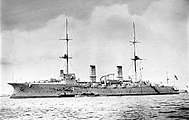From today's featured articleCyclone Ada was a small but intense tropical cyclone that severely impacted the Whitsunday Region of Queensland, Australia, in January 1970. It formed over the far eastern Coral Sea early in the month, remaining weak and disorganised for nearly two weeks before being named. The extremely compact cyclone, with a reported gale radius of 55 km (35 mi), intensified into a Category 3 severe tropical cyclone just before striking the Whitsunday Islands on 17 January. Resorts on Daydream, South Molle, Hayman and Long islands were obliterated. Based on the severity of the damage, wind gusts were later estimated at 220 km/h (140 mph). Near the point of Ada's landfall, almost all the homes in Cannonvale, Airlie Beach and Shute Harbour were destroyed. Rainfall totals as high as 1.25 m (49 in) caused massive river flooding in coastal waterways between Bowen and Mackay. Ada killed 14 people, including 11 at sea, and caused A$12 million in damage. (Full article...)
Recently featured:
Did you know ...
|
In the news
Qasem Soleimani in 2019
Qasem Soleimani
On this day
Antoine Thomson d'Abbadie (b. 1810) · J. R. R. Tolkien (b. 1892) · Joy Adamson (d. 1980) |
From today's featured list
The Imperial German Navy built a series of protected cruisers in the 1880s and 1890s, starting with the two ships of the Irene class. The Navy only completed two additional classes of protected cruisers, comprising six more ships: the unique Kaiserin Augusta, and the five Victoria Louise-class ships. Because of limited budgets in the pre-Tirpitz era, the German Navy attempted to build vessels that could serve as overseas cruisers and scouts for the fleet, though the ships were not satisfactory. Most of the German protected cruisers served on overseas stations throughout their careers, primarily in the East Asia Squadron in the 1890s and 1900s. Prinzess Wilhelm participated in the seizure of the Kiautschou Bay concession in November 1897, which was used as the primary base for the East Asia Squadron. Kaiserin Augusta, Hertha, and Hansa (pictured) assisted in the suppression of the Boxer Rebellion in China in 1900, and Vineta saw action during the Venezuelan crisis of 1902–1903. (Full list...)
Today's featured picture

|
The climate of Alaska is influenced by its maritime position and its location partly within the Arctic Circle. In the southeast, Alaska has an oceanic climate, in the central region, a subarctic climate and, in the north, a polar climate. Seen here in winter from NASA's Aqua satellite, some 700 km (430 mi) up, the Alaskan ground is blanketed by snow, and ice is creeping out over the sea, with some of the coastline being indistinct. The tundra appears white, while the evergreen trees of the boreal forest make the forested areas appear darker, and the sinuous courses of rivers can be seen. The greenish color of the Bering Sea may indicate a phytoplankton bloom or may be the result of turbulence caused by winter storms. Photograph credit: NASA / MODIS / Jeff Schmaltz
Recently featured:
|
Other areas of Wikipedia
- Community portal – Bulletin board, projects, resources and activities covering a wide range of Wikipedia areas.
- Help desk – Ask questions about using Wikipedia.
- Local embassy – For Wikipedia-related communication in languages other than English.
- Reference desk – Serving as virtual librarians, Wikipedia volunteers tackle your questions on a wide range of subjects.
- Site news – Announcements, updates, articles and press releases on Wikipedia and the Wikimedia Foundation.
- Village pump – For discussions about Wikipedia itself, including areas for technical issues and policies.
Wikipedia's sister projects
Wikipedia is hosted by the Wikimedia Foundation, a non-profit organization that also hosts a range of other projects:
Free media repository
Wiki software development
Wikimedia project coordination
Free textbooks and manuals
Free knowledge base
Free-content news
Collection of quotations
Free-content library
Directory of species
Free learning materials and activities
Free travel guide
Dictionary and thesaurus



